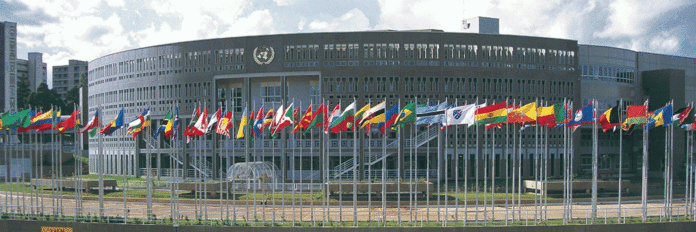
Staff Writer
The Economic Commission for Africa is making significant progress in supporting African countries to leverage the African Continental Free Trade Area (AfCTA) to drive digital trade on the continent.
Addressing the ongoing 39th ECA Committee of Experts of the Conference of African Ministers of Finance, Planning and Economic Development Daya Bragante, Head of the Sub-Regional Initiatives Cluster in the ECA’s East Africa Sub-Regional Office (SRO-EA), said the increasing impact of digitization revealed that there was an urgent need to continue developing capacity of member States so their economies can harness digital trade to encourage sector-wide economic development.
Her presentation focused on the implementation of resolutions of the 52nd session of the Conference of African Ministers of Finance, Planning and Economic Development, and the 2020 extraordinary meeting of the Bureau of the Economic Commission for Africa.
She said with the AfCFTA now operational, there was scope to pursue regional strategies to develop Africa’s digital economy. يورو اوروبا 2023
“ECA has been supporting the African Union Commission in the development of a digital strategy for Africa. The continental digital transformation strategy is designed to harness the benefits of digitalization and support the implementation of digital trade, digital identity and digital economy programmes in support of the AfCFTA,” Bragante said.
The ECA, she added, was working on establishing the Digital Earth Africa programme, intended to deliver an exceptional fit-for-purpose platform that can translate over 50 years of Earth observation satellite imagery into information and insights on changes on land and sea in Africa.
Digital Earth Africa will build on the Data Cube technology to deliver a unique continental-scale structure and tools that democratize the capacity to process and analyse satellite data into ready-to-use insights about the continent’s environmental conditions, including soil and coastal erosion, agriculture, forest and desert monitoring, water management, and changes to human settlements, disaster risk management and other processes.
Bragante said the Centre of Excellence for Digital Identity, Trade and Economy, established in 2018, was providing the necessary support to Member States to use digitalization as a catalyst for inclusive and sustainable growth in Africa. كوكن
“In particular, the Centre will promote the harmonization of standards across member States, support the development of regulation to safeguard security and promotion of investments in infrastructure, and develop capacity and skills of key stakeholders, including the private sector, so they can embrace opportunities for innovation and job creation that digitalization presents,” she said.
In addition, the Centre will seek to backstop support provided by ECA for the creation of a digital common market under the AfCFTA so countries can take advantage of opportunities and benefits associated with the digital economy in a continent-wide market.
As one of its key deliverables, the Centre focuses on the development of strategic and legal frameworks for a harmonized legal identity that is based on a strong civil registration system and enabled by digitalization.
Meanwhile, development experts also told the same conference that Africa needs to build back and forward better by investing in training, statistical and trade capacity to inform policy implementation in achieving the sustainable development goals on the back of the COVID-19 pandemic.
Speaking in a session presentation on economic and social development, Ngone Diop, Director of the Economic Commission for Africa’s (ECA) Sub Regional Office for West Africa, noted that the disruptive impact of COVID-19 on the economic well-being of ECA member countries made investment in capacity building more crucial for the achievement of the SDGs.
Her presentation was on the outcome of the ECA’s sub-regional offices’ Intergovernmental Committees of Senior Officials and Experts (ICSOE).
“There is need to respond decisively to COVID-19’s health and socioeconomic impacts, including through effective collaboration,” Ms. Diop told the meeting, highlighting one of the recommendations from the ICSOEs.
The ICSOEs provide strategic direction to the work of the Sub-Regional Offices, offering senior officials and other technical experts a platform to discuss economic and social development issues across the sub regions.
Presenting at the same session, on the work of the African Institute for Economic Development and Planning (IDEP), the Director, Karima Bounemra Ben Soltane, underscored the need for training and capacity building for Africa to realise the SDGs on poverty reduction, economic growth and work, reducing inequalities and building sustainable partnerships.
The African Institute for Economic Development Planning is the training arm of the ECA, based in Senegal.
It has helped build capacity of ECA member countries on many developmental issues and recently on e-learning and preparing them on the newly launched Africa Continental Free Trade Area (AfCFTA).
“Capacity building is a key issue, a prerequisite to build forward better for Africa,” Soltane, emphasized. “We are training to make a difference in Africa’s development.”
The institute provides focused research, training and knowledge management for ECA Member States.
It has migrated training courses from physical delivery to online platforms, which Soltane said had doubled participation in training courses.
In 2020, the Institute trained 2300 people above the target of 2000, with more women participating in the programmes despite limited access to ICTs.
“There is no development without training,” Soltane said, urging for the harnessing of ICTs in building the skills capacity in Africa to tap opportunities presented by the AfCFTA and in meeting the SDGs.
The SDGs will remain a bridge too far, if there is no capacity to utilise vital data and statistics, Tinfissi-Joseph Ilboudo, Chief, Statistical Development, Data Innovation and Outreach Section in the African Centre for Statistics told the conference.
Ilboudo noted that Africa needs to prioritise and invest in robust and agile statistical systems to help it meet the SDGs through the generation and use of timely and relevant data. روليت اون لاين
Africa, he said, is challenged by a poor and under sourced civil registration and vital statistics systems (CRVS) which are still largely paper based. Yet a functional CRVS system compiles and disseminates vital statistics such as birth, death records and other demographics on time, regularly and online to enable development planning and investment.
“There is need for security and public confidence in CRVS systems to ensure that we provide correct statistics for planning and that will ensure we leave no one behind in development,” said Ilboudo.
He said to meet the SDGs, which need more $200 billion annually to achieve, there was need for robust policies to plug the data and statistical gaps which militate against the prioritisation of adequate technical and financial resources towards SDGs.
Africa needs to integrate geospatial information into national development plans to accelerate the attainment of SDGs, urged Ilboudo, in presenting a report on the Fifth Conference of Ministers Responsible for Civil Registration and the seventh meeting of the Statistical Commission for Africa.
The Conference with the theme, Africa’s sustainable industrialisation and diversification in the digital era in the context of COVID-19, is being attended by technical experts from across Africa under the critical ministries of Finance, Planning and Economic Development.










